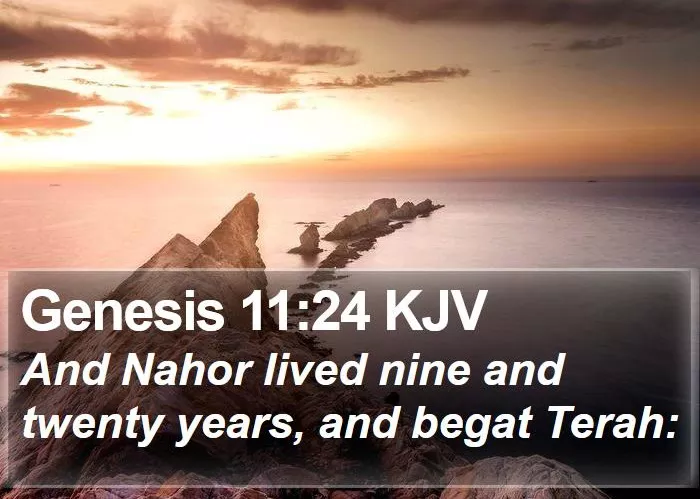Read the Daily Bible Verse Genesis 11:24 To Strengthen Your Spiritual Journey.
Genesis 11:24 is a verse in the Bible that reads: “And Nahor lived nine and twenty years, and begat Terah” (KJV). This verse is part of the genealogical record in Genesis, which traces the lineage from Noah to Abraham. Understanding this verse requires delving into its context, meaning, and relevance both historically and in modern times.
The Context on Genesis 11:24 KJV
Genesis 11:24 is situated within a genealogical passage that spans from Genesis 11:10 to 11:32. This section of Genesis outlines the descendants of Shem, one of Noah’s sons, leading up to Terah, the father of Abraham. The genealogies in Genesis serve multiple purposes: they establish historical continuity, demonstrate the fulfillment of God’s promises, and set the stage for significant biblical narratives.
The context of Genesis 11:24 is crucial because it marks a transition from the post-flood world to the era of the patriarchs. The genealogies highlight the decreasing lifespans of humans, reflecting a shift from the antediluvian (pre-flood) to the postdiluvian (post-flood) world. This verse specifically mentions Nahor, who is the grandfather of Abraham, a central figure in the Bible.
The Genesis 11:24 Meaning
The primary meaning of Genesis 11:24 is genealogical. It records the age at which Nahor fathered Terah, continuing the lineage from Shem to Abraham. This lineage is significant because it connects the story of creation and the flood to the story of Abraham, who is considered the father of the Israelite nation and a key figure in the Abrahamic religions (Judaism, Christianity, and Islam).
The genealogies in Genesis, including Genesis 11:24, also serve to show the faithfulness of God in preserving a lineage through which He would fulfill His promises. Despite the sin and rebellion of humanity, God’s plan continues through specific individuals and families.
Genesis 11:24 Application in Life
While Genesis 11:24 may seem like a simple genealogical record, it holds deeper applications for life. Here are a few ways this verse can be applied:
Faithfulness of God: This verse reminds believers of God’s faithfulness in fulfilling His promises. Despite the passage of time and human failures, God’s plan continues unabated.
Importance of Heritage: Understanding one’s spiritual heritage can be a source of strength and identity. Just as the Israelites traced their lineage to Abraham, Christians can trace their spiritual heritage through the biblical narrative.
Continuity of God’s Plan: The genealogies show that God’s plan is continuous and involves many generations. This can encourage believers to see their lives as part of a larger divine narrative.
See Also: What Does Genesis 11:23 Mean?
Comparison with Other Biblical Texts
Genesis 11:24 can be compared with other genealogical records in the Bible, such as those in Genesis 5 and Matthew 1. These comparisons reveal patterns and themes in the biblical narrative:
Genesis 5: This chapter lists the descendants of Adam, highlighting the long lifespans before the flood. Comparing Genesis 5 with Genesis 11 shows the dramatic decrease in lifespans after the flood.
Matthew 1: The genealogy of Jesus in Matthew 1 traces His lineage through Abraham, showing the fulfillment of God’s promises to Abraham and his descendants. This genealogy connects the Old Testament to the New Testament, emphasizing the continuity of God’s plan.
Modern-Day Relevance
Genesis 11:24 remains relevant today for several reasons:
Historical Continuity: This verse helps modern readers understand the historical continuity of the biblical narrative. It connects the early chapters of Genesis with the story of Abraham, providing a foundation for understanding the rest of the Bible.
Faith and Trust: The genealogies remind believers of the importance of faith and trust in God’s plan. Despite the uncertainties of life, God’s purposes are being fulfilled through generations.
Identity and Purpose: Understanding one’s place in the larger story of God’s plan can give a sense of identity and purpose. Believers can see themselves as part of a long line of faithful individuals who have played a role in God’s redemptive history.
Conclusion
Genesis 11:24, while seemingly a simple genealogical record, holds significant meaning and relevance. It connects the post-flood world to the era of the patriarchs, demonstrates God’s faithfulness, and provides a foundation for understanding the biblical narrative. By examining this verse in its context, comparing it with other biblical texts, and applying its lessons to modern life, believers can gain a deeper appreciation for the continuity and purpose of God’s plan.
Genesis 11:24 Commentary
Commentaries on Genesis 11:24 provide additional insights into its meaning and significance. For example, John Gill’s Exposition of the Bible notes that Nahor, the father of Terah, was the first of the patriarchs in this line to fall into idolatry. This highlights the spiritual challenges faced by Abraham’s family and the significance of Abraham’s call to monotheism.
Matthew Henry’s Concise Commentary emphasizes the genealogical record’s role in leading to Abraham, the friend of God, and ultimately to Christ. This commentary underscores the importance of understanding these genealogies as part of the larger redemptive history.
In conclusion, Genesis 11:24 is more than just a record of Nahor’s age and his fathering of Terah. It is a crucial link in the biblical narrative, demonstrating God’s faithfulness, the importance of heritage, and the continuity of His plan. By studying this verse in depth, believers can gain valuable insights into their faith and the overarching story of the Bible.

